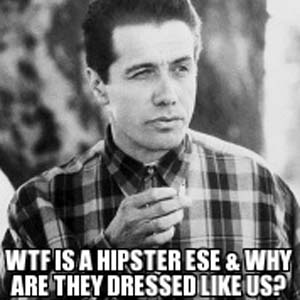I ride a pink road bike named Rosita or a commuter folding bike, rock the thrift store combat boots with floral print dresses, listen to independent local artists like Chicano Batman, L@s Cafeter@s, eat vegan burritos, etc.
As a matter of fact, one or more of my closest companer@s can check the boxes off POCHO’s Chiptser Check-off list. It’s with this Curriculum Vitae that I am qualified to write on the Chipster question, right?
OK, but, let me keep it real. I’m not actually a self-identified Chipster any more than the trendy white kids in the gentrified Echo Park self-identify as Hipsters. “Chipster” and “Hipster” actually have a number of things in common, but probably not what you would imagine.
For starters, you won’t find any of them (except maybe a couple of attention-lovers who shall remain nameless). That’s because like “Hipster,” the “Chipster” is made-up!!
Thanks again to Corporate America.
Companies like Urban Outfitters and American Apparel and developers in neighborhoods like Echo Park have been hard at work for years now marketing the Hipster Aesthetic. Hipster has come to mean a vague catch-all term for paying bourgeois prices for pretty much anything working-class, DIY or counter-culture” Think $100 distressed t-shirts, $5 cans of Pabst Blue Ribbon and an encroaching of gentrifiers on neighborhoods like Skid Row.
Like the Eddie Olmos meme so poignantly illustrates, a lot of us working class/POC/counter-culture peeps have been all, WTF, at the Hipster phenomenon. Why is it suddenly trendy to act like you’re poor when you have money and why are some aspects of counter-culture going mainstream? What are the politix of Chipster and the implications for working class and counter-culture communities whose territory is being consumed by moneyed culture vultures?
For example, the recent Urban Outfitters UFW logo scandal illustrates how it can be fashionable to sell the farmworker’s struggle while not actually supporting the struggle. Or the Telemundo report on Chipsters where some folks weren’t even informed about the name of the segment and were asked by the interviewer only to describe their personal styles to get ratings.
The truth is that the Chipster identity, like the Chican@ identity, represents an internal conflict within working class and counter-culture Chican@s and a fine line we must tread between making our struggles popular and having them be consumed completely by the corporate mainstream.
Speaking for myself personally, I would love to see more people on bicis because it’s a more sustainable, affordable transportation method and a big F*** YOU to the auto and fuel industries buuuut then get sidetracked having to explain to men or white folks why we need womyn of color cycling spaces. Are we sometimes doing more harm than good by popularizing our counter-cultura?
Food is another big one. If I had it my way, working class POC would work in autonomous communities growing and sharing our own food supply, eating elote like our ancestors but for now the best we can do is promote autonomous collectives like Comida No Bombas who shop or get donations from farmers markets and dumpster dive at corporate dumpsters alongside middle class white people in the suburbs…
It’s kinda cool to see some local artists get mainstream recognition and I got this funny feeling of butterflies when my tia all the way from Michigan posted L@s Cafeter@s’ Bamba Rebelde on my Facebook wall.
It’s hard to say if it’s a good thing or not that “Chipster” is even a thing!
Just maybe, we can reclaim the term Chipster and save cultura? If we claim it and say it isn’t for sale, maybe we can avoid the pitfalls of the hip-hop generation.
Only time will tell.
Reprinted by permission from La Maga Del Barrio.

